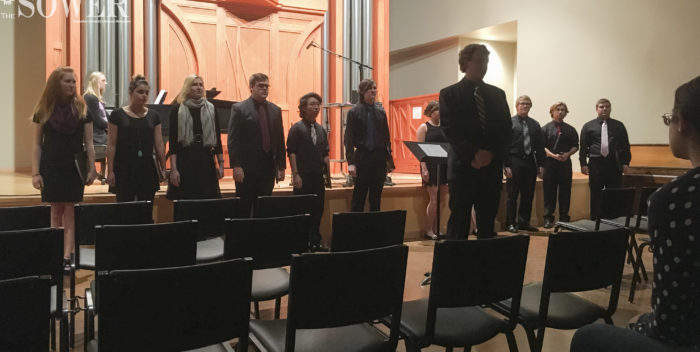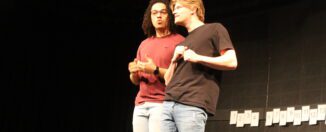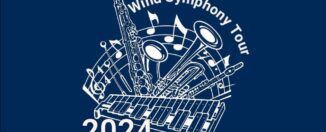Students Premiere New Music in Composers Recital
Sophomore Aaron Huesmann stands at the front of Concordia’s recital hall with an ensemble of 11 singers for the Student Composers Recital. Photo by Jayme Lowe.
by Jayme Lowe
Eight musical pieces had their world premiere at the Student Composers Recital on Nov. 6.
Six composition students, including junior Thomas Johnson, sophomore Aaron Huesmann, and seniors Caleb Silcott, Jacob Sumpter, Albert Boldt and Austin Theriot had their creations performed. All take composition lessons from Music Instructor David von Kampen.
Johnson began the recital with his piece “Tavern,” with the text based on a poem by Edna St. Vincent Millay. An ensemble of 12 performed the piece, conducted by Johnson. As the song began, Johnson had the audience close their eyes and imagine themselves as weary travelers coming upon a tavern. The piece was performed a cappella.
The next performance was Theriot and his “Etudes for Flute and Live Electronics.” Theriot played the flute live, into a microphone, which pushed the sound into a computer, which created unique impressions of the flute’s notes, adding to the piece. Theriot performed three etudes: “Echo,” “Quiet” and “Canopy.” Each used the flute’s notes in a different way. For example, during “Canopy,” the produced sound was reminiscent of twittering birds.
Caleb Silcott’s piece “Wind and Rain,” featuring Johnson on clarinet, Angel Silcott on cello, and Caleb Silcott himself on piano, was the third piece of the night. The instruments mimicked the sounds of a rainstorm, and Silcott asked the audience to listen as though they were “curled up with a book.”
“Katabasis and Grace” came next, with words and music by Sumpter. “Katabasis” means “descent,” and Sumpter compared the piece to Dante’s “Inferno,” with a descent into darkness but still a redeeming quality of grace. The piece was performed by an ensemble of 12, with Silcott accompanying and Sumpter conducting.
Boldt’s piece was for the piano, and he stated that it reflected the work that he had been putting in with von Kampen. The damper pedal featured heavily, and the piece stood out as the only one written for a single instrument.
Huesmann’s piece, “Twas Midnight,” a Christmas composition, came next. The text was based on a poem by R. S. Trend, and an ensemble of 11 singers brought the piece to life, conducted by Huesmann and accompanied by sophomore Charlotte Lines. The song drew attention to the shepherds out in the field and the anticipation of the angels’ message of Christ’s birth. Sophomore Keziah Bruns, a member of the performing ensemble, said that they rehearsed about twice a week to prepare for the recital.
“It was a lot of fun; it was cool to see the piece come together,” Bruns said.
The final two pieces, both composed by Theriot, were performed as a set. “Wundra Gihwæs” was a setting of the oldest known sacred Old English poem. The title translates to “For Every Wonder.” Senior Matthew Gerhold performed the piece, accompanied by Theriot. The text reflects God as creator, a theme that was carried into the second piece of the set, “The Garden,” with a text based on an e. e. cummings poem. This composition was a cappella, performed by an ensemble of nine, including Theriot.














